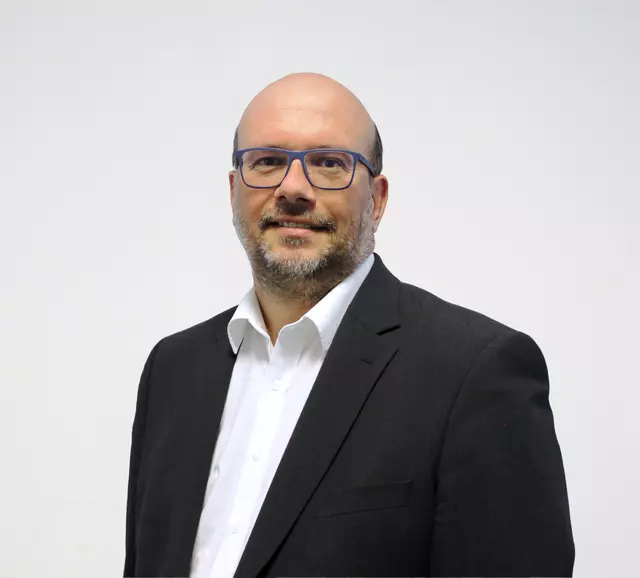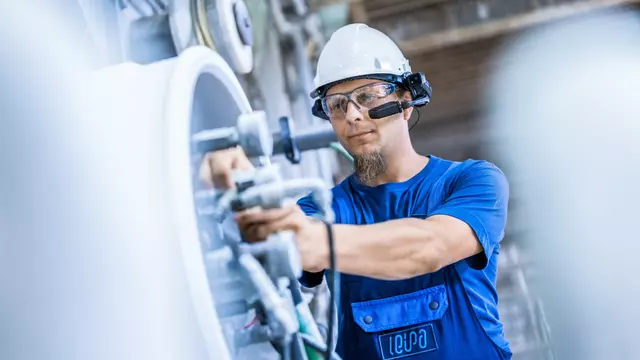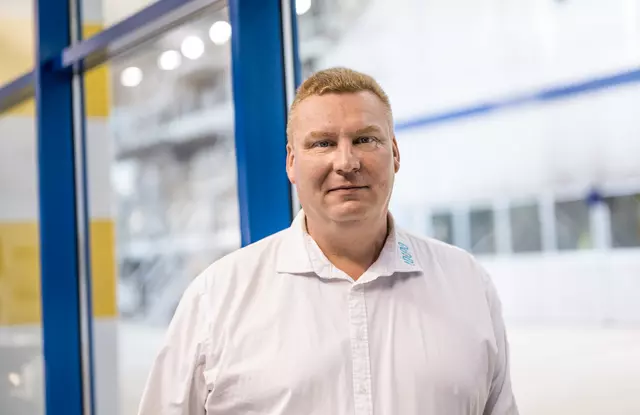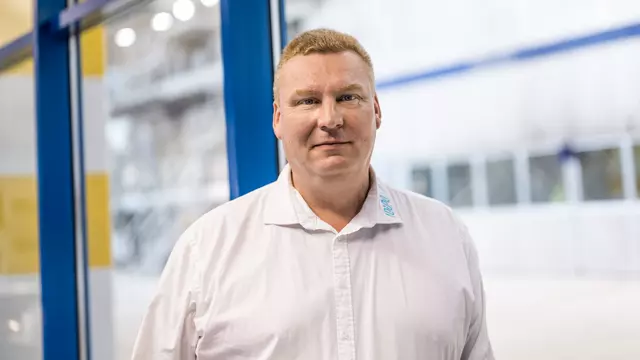Learn in the virtual world to improve reality
Digital learning in virtual reality may sound like futuristic science fiction but the technology has already arrived in practice. In Brandenburg, Voith and paper producer LEIPA show how virtual reality significantly improves the quality and efficiency of training to increase safety and reduce costs. In addition, since LEIPA uses the remote video system OnCall.Video, the company can quickly draw on external specialist knowledge when carrying out maintenance and repairs. The two solutions generate additional added value – and some unexpected benefits.
Friday afternoon. The weekend is within reach, concentration is flagging. When the maintenance technician reaches the basement of the paper machine during an inspection round, he makes a serious mistake. Directly above his head is a chemical pipe with damage to one part of the flange. Due to the diffused lighting, he overlooks this detail – and he also doesn’t see that a chemical is leaking through the damaged part. It drips onto him and burns his skin. A serious occupational accident.
Actually, it’s just a simulation; the employee is not really injured. This is not a scene from the mill, but rather part of a training program in Voith PaperSchool’s virtual reality application. With a virtual reality headset and hand controllers, the participants experience the simulated reality of a paper machine. In it, tasks such as preventive maintenance work on the paper machine can be practiced with maximum realism, but with absolutely no danger and without any downtime or resource consumption.
Active learning rather than passive consumption
Paper producer LEIPA Georg Leinfelder GmbH recognized the potential. At the Schwedt (Brandenburg) location, the company successfully uses Voith PaperSchool’s VR system for their training and professional development.
When they put on the VR headset, which completely covers the eyes and is connected wirelessly without any cables to get in the way, participants are immediately immersed in the virtual world. The real surroundings are blocked out so they can concentrate fully on the training. Because the relative sizes in the VR world correspond exactly to the real ones, the same impression of space is created. “Within 15 seconds at the most, the participant thinks he is standing in the machine room,” explains Voith PaperSchool Manager Michael Neumann.

Voith is developing the VR training content specially for each application area in the paper industry. Thus, in the field of preventive maintenance, tasks such as the sleeve change on the shoe press, installation and dismantling of the screen basket during a change, or the blade change on the winder can be trained. All activities which would result in downtimes and therefore high consequential costs if trained in the real production facility. A training module for the important topic of occupational safety is also available. In line with the importance of this topic, it conveys particularly vivid, at times drastic impressions. “Virtual reality offers a huge advantage in this respect because everything is just simulated,” Neumann makes clear. “You could even die in this module, the clear aim of which is to create greater awareness.”
In addition to these aspects, Steffen Deszpot, Head of Technology at LEIPA, also points out the better planning capability. “In my experience, it can be difficult to make bigger groups of trainees available all at the same time for a training course. With the VR solution, on the other hand, employees can complete the training modules assigned to them independently at a time that suits, tailored to their shift or working hours. We see the more flexible use of working hours as a huge win.”

Fast remote installation with OnCall.Video
Specifically for the high-tech training program, LEIPA transformed a conference room into a virtual reality studio at the company premises in Schwedt.
However, the launch was delayed due to the Covid-19 pandemic and the associated physical distancing restrictions. OnCall.Video was a savior, bringing the standstill to an end. Since LEIPA also uses the Voith video communications and collaboration tool with wireless camera glasses, the team could be given remote instruction for the final VR installation tasks. “The room was already prepared and the sensors attached,” recalls Patrick Dengel, Digital Tools Manager at Voith. “We handled the details via OnCall.Video. For this, the glasses were integrated into the LEIPA wireless network, via which a video and audio connection to the Voith experts in Heidenheim was established.”
Without the remote connection, the technology would not have been functional as quickly. The remote connection saved several working days because there was no need to travel for an on-site installation. Within three hours, we got the system up and running and carried out two test training sessions,” sums up Michael Neumann.

Digital added value for knowledge management, recruiting and image
Through the digitalization of its training measures and preventive maintenance tasks with the help of Voith solutions, LEIPA has created numerous new options. For example, if there are problems in the production flow, the company can also draw on know-how outside the company through OnCall.Video to save time and money in finding solutions.
“No manufacturer can have all the experts on site, which means being able to call on external expertise is all the more important,” emphasizes Patrick Dengel. “In principle, I can guide everything with the tool,” adds his colleague Stefan Endras, Product Manager OnCall.Video. “Our main emphasis is on quickly connecting the customer with the experts. In this way, we can also partially compensate for the lack of skilled workers.” Further added value is also offered to companies through the fact that various locations can easily be connected to each other. OnCall.Video makes it possible to pass on know-how from the various areas within the company and to promote the exchange of specialized information between them.
The benefits of the VR system offered by Voith PaperSchool also extend far beyond the main application area of highly effective basic and advanced training that has a lasting impact. In cooperation with students from Stralsund University of Applied Sciences, for example, LEIPA is planning to visualize its digital data streams from the process control systems in multidimensional data spaces. By doing so, the company aims to gain insights that go far beyond the usual statistics and help to increase efficiency.

However, LEIPA also sees added value in terms of its external image and recruitment of employees. Through the virtual reality solution and OnCall.Video, the company can underscore its digital competence and simultaneously strengthen its employer brand: important advantages not just among the competition but also so that it can present itself as a “digital champion” when recruiting. Steffen Deszpot is convinced that the fact his company can equip workplaces with state-of-the-art technology thanks to Voith solutions helps him to offer an attractive environment for professionals.
In an interview, Steffen Deszpot, Senior Maintenance Manager at LEIPA, describes the didactic and economic advantages associated with the virtual reality training from Voith PaperSchool.
Interview “That’s E-Learning 2.0”

“That’s E-Learning 2.0”
Where do you see the most important advantages of training courses using the VR solution from Voith PaperSchool over knowledge transfer via book, presentation, or video?“Students” can achieve their learning outcomes independently at their own pace using all their senses in a previously unknown, but very exciting, way – a hands-on solution, so to speak. Through the active integration into the virtual world, the students “create” their own learning world in which they are completely immersed. Feedback has shown that the simulated reality achieves a higher level of acceptance than, for example, an instructional video or a written manual does.
In your opinion, are the advantages of the VR training of a more qualitative or quantitative nature?
Both. Because training is always completed by just one “student” at a time, it is more intensive than group training, which makes for more sustainable learning success. Experience has shown that it is also fairly difficult to release larger groups of people simultaneously for a group training program, so the VR solution is just what we need. It enables employees to independently complete training courses assigned to them virtually 24/7 at freely selectable times tailored to their shifts or working hours. We see the more flexible use of working hours as a huge win.
Do you also want to use the VR installation for other purposes besides training?
The VR system installed here is so openly designed that any type of VR application, besides the innovative Voith PaperSchool, which is aimed more at the papermakers and technicians and is constantly being extended to supplement the previously available modules, can be integrated. Open source projects that, for example, consider the current topic of “Big Data & Industry 4.0,” i.e. typical issues for developers and technologists, are also being contemplated. For that reason, among other things, we are working with students from Stralsund University of Applied Sciences to visualize our enormous digital data streams from the process control systems in virtual, multidimensional, multivariable data spaces and thus gain graphical and visual knowledge that goes far beyond today’s standard statistics and known soft sensor/predictive control/APC/level 2 control systems. We are entering a completely new world of data processing here. A use for our customers, apprentices, students, and external parties is likewise conceivable: I can easily imagine ambitious apprentices across all trades virtualizing an interactive mill tour or specific process or maintenance flows. In my view, that’s E-Learning 2.0.
How have your initial experiences in using the system been and how has the response from participants been so far?
Up to now, only a few people have gotten to know the complete extent of the system as testers. But everyone who enters the virtual world for the first time lets out an “ahh” or an “ohh.” Some first have to get their bearings and nearly lose their balance when they suddenly find themselves on the catwalk of the digitalized PM 4 seven meters above the floor. Because we also mounted a screen on the wall to project a 2-D map of the VR scene, the impression is also conveyed audiovisually to other people and trainers in the room. These observers also “dove” into the VR world in our tests – the spacey overall design of the room definitely contributes to that.
Do you also expect the use of VR to benefit the company’s external image?
By all means. It affects not just the new VR learning world but also the AR technology already in use by technicians and production workers. Besides the “usual” digital aids such as real-time databases for PLS data, SAP, condition monitoring & thermal cameras for condition-based maintenance, APC control systems, material/energy/cost monitoring, etc., LEIPA, the family company with a long history, is once again showing the way to the digital future of the industry.



